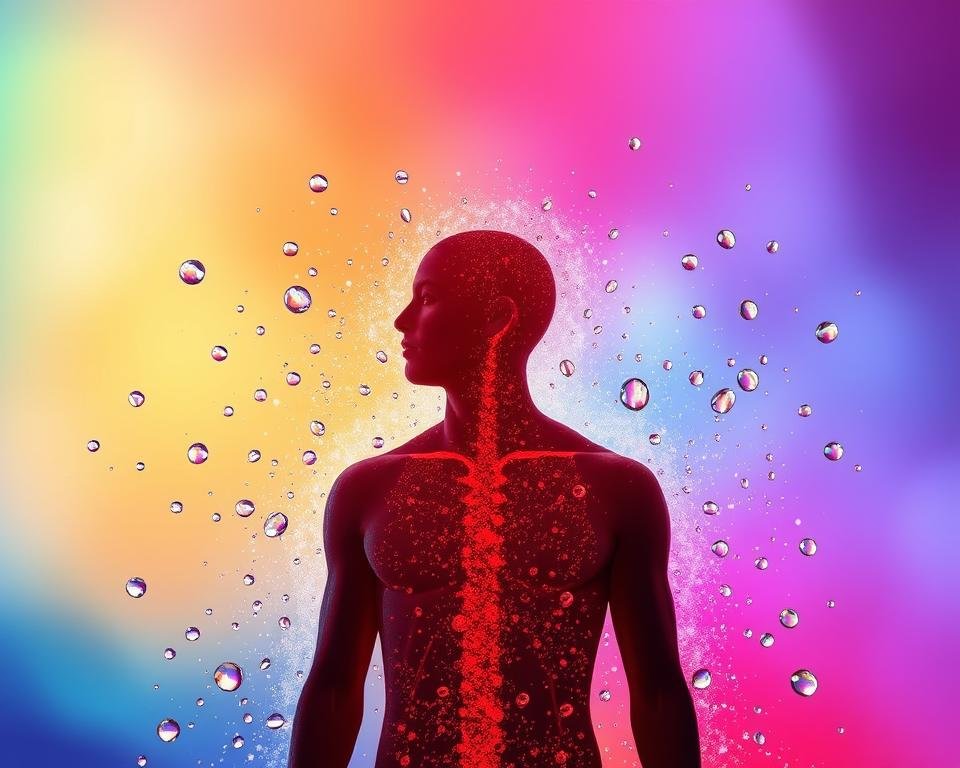Sweating alone doesn’t burn many calories or help with weight loss. In fact, sweating mainly helps the body cool, not burn fat. Sweating might make you lose water weight, but you’ll gain it back when you drink water again.
To lose weight, you need to eat less and exercise more. Sweating alone isn’t enough. In this article, we’ll look into the science of sweating and its role in calorie burn and weight management.
Sweating is how our body cools down when it gets too hot. While it happens during exercise, sweating itself doesn’t burn calories. To lose weight, you need to burn more calories than you eat, which usually happens through diet and exercise.
Understanding the Relationship Between Sweat and Calories
Sweating helps keep our body temperature in check. But, it doesn’t burn many calories. The energy used by sweat glands is small. This means sweating alone won’t help you lose weight much.
The Basic Science of Sweating
Sweat is mostly water, with a bit of carbs, salt, protein, and urea. The energy for sweat comes from glucose, but it’s very little. Sweating mainly helps cool us down when we’re active or it’s hot outside.
Common Misconceptions About Sweat and Weight Loss
Many think do you burn more calories when you sweat or sweating causes you to lose weight. But, this isn’t true. Sweating might make you lose water weight, but it’s not fat loss. To lose weight, you need to eat less and exercise more.
How Your Body Regulates Temperature
Keeping our body temperature right is complex. Sweating is a key way to cool down. When we get hot, sweat helps lower our temperature. This keeps our body working well.

Things like genetics and how fit you are affect how much you sweat. Sweating is natural in heat or when we’re active. But, it doesn’t burn many calories. To lose weight, you should eat well and exercise regularly.
Does Sweating Burn Calories: The Truth Behind the Myth
The idea that sweating alone can burn a lot of calories is a myth. While sweating does use some energy, it doesn’t burn many calories. It’s the effort of exercising, not just sweating, that burns calories.
Research shows that even in activities like Bikram yoga, the calorie burn is similar to brisk walking. This proves that sweating doesn’t lead to burning a lot of calories. Sweating helps the body cool down, not burn fat or lose weight.
Sweating mainly means losing water weight, and this weight comes back when you drink water again. Real fat loss comes from burning more calories than you eat, through regular exercise and a healthy diet, not just sweating. For example, lifting weights increases your resting metabolic rate, meaning your body burns more calories even when you’re not moving.
“Sweating alone doesn’t burn calories. It’s the physical activity that causes the sweat that burns the calories.”
Eating balanced meals with lean proteins, whole grains, and fruits helps lose fat better than sweating alone. Saunas and sweat suits might make you lose water weight, but this isn’t a lasting way to lose fat. Building muscle through strength training is key to burning more calories and shaping your body.
Sweating too much without drinking enough water can cause dehydration. Using products like Degree deodorants can help control sweat and make workouts more comfortable. In the end, sweating doesn’t show how many calories you’ve burned or how much weight you’ve lost. The focus should be on the intensity and type of exercise, not just how much you sweat.

The Role of Sweating in Weight Loss
Sweating is often seen as a way to burn calories and lose weight. But, the truth is more complex. Sweating can lead to losing water weight, but it doesn’t directly mean you’re losing fat. The calories burned while sweating are actually quite small compared to other activities.
Water Weight vs. Fat Loss
When you sweat, you lose water weight, not fat. This water weight can change daily, from one to five pounds. Losing fat takes longer and is more steady. Losing water through sweating might seem like weight loss, but it’s not a healthy or lasting way to lose weight.
Temporary Weight Loss Through Dehydration
Sweating can cause a quick loss in water weight. But, once you drink water again, the weight comes back. This is why wrestlers and racehorses do it to meet weight classes. But, it can hurt their performance, even more so for women.
Real Caloric Expenditure During Sweating
Sweating itself doesn’t burn many calories. Exercise that makes you sweat can help with weight loss by creating a calorie deficit. But, sweating alone doesn’t burn a lot of calories. For lasting weight loss, a balanced diet and regular exercise are better than just sweating.
To summarize, sweating can cause temporary water weight loss, but it’s not a good or healthy way to lose fat for the long term. For lasting weight management, focus on a balanced diet, regular exercise, and staying hydrated.

“Sweating is a natural body process that helps regulate temperature and expel excess heat, but it does not directly translate to fat loss. For sustainable weight management, a holistic approach involving diet, exercise, and proper hydration is recommended.”
Factors That Influence How Much You Sweat
Wondering if sweating more helps burn more calories? The answer might surprise you. The amount of sweat you produce doesn’t directly relate to calorie burn or fat loss. Sweating itself does not burn fat. Fat loss comes from eating fewer calories than your body needs.
So, what makes you sweat more? It’s mainly about your body’s ability to control temperature. This is influenced by several things:
- Genetics – Some people naturally sweat more due to their genes.
- Environmental conditions – Hot, humid, or hard environments make you sweat more as your body tries to cool down.
- Age – Older people sweat less because their sweat glands don’t work as well.
- Fitness level – Fitter people sweat more during exercise because their bodies are better at cooling down.
- Body weight – Heavier people sweat more because there’s more skin to cool.
Sweating is a sign of hard work, but it doesn’t mean you’re burning more calories or losing fat. To lose weight, focus on eating well and staying active. Choose activities that fit your fitness level and goals.
“Sweating is a mechanism to regulate body temperature, not a direct measurement of fat loss or calorie burn.”
Exercise, Calorie Burn, and Sweating
Many think sweat shows how many calories you burn. But, it’s not that simple. How hard you exercise is a better way to measure calorie burn. Even low-intensity workouts can burn calories without making you sweat a lot.
How much you sweat while exercising depends on many things. Your fitness level, genetics, age, and where you exercise all play a part. Sweating helps your body cool down, not just show calorie burn.
High-Intensity vs. Low-Intensity Activities
High-intensity workouts like HIIT or fast running burn more calories. But, not everyone sweats more during these activities. Some people might sweat less because their body is good at cooling itself.
The Connection Between Exercise Intensity and Sweat Production
Exercise intensity is a better sign of calorie burn than sweat. But, they’re connected. As you get fitter, your body gets better at cooling itself. This means you might start sweating sooner and more consistently during workouts.
So, the amount of sweating does not necessarily mean your burning calories or that sweating can help you lose weight. Better ways to track your workout include heart rate, fitness watches, and the Rate of Perceived Exertion (RPE) scale.
“Sweat is not directly related to burning calories or fat during exercise. Multiple factors influence individual sweat levels, including environmental conditions, genetics, age, weight, fitness level, health status, and hydration.”
Health Benefits of Sweating Beyond Calorie Burn
Sweating may not burn many calories, but it has many health benefits. It helps keep your body temperature in check and boosts heart health by improving blood flow. It also helps your skin by bringing nutrients and oxygen to skin cells.
Some research suggests sweating can help remove toxins from your body. Regular exercise that makes you sweat can also improve your fitness and help with weight management if you eat well.
A study in the International Journal of Environmental Research and Public Health found that exercising in warmer temperatures can increase calorie burn. This is because it raises your heart rate and metabolism. Even after you stop exercising, your body keeps burning calories, a process called the “afterburn effect.”
Research in the Galen Medicine Journal shows sweating can help get rid of waste and toxins. This can improve your health and how well your body uses energy. Infrared workouts, for example, can help with joint pain and make your skin look better by boosting collagen and improving blood flow.
“Using 3D Training, combining infrared heat, isometric holds, and high-intensity interval training (HIIT), allows for a more intense workout in less time,” says Smith, founder of HOTWORX, a 24-hour infrared workout studio.
But, it’s key to talk to a doctor first, if you have heart problems, get dizzy easily, or are very sensitive to heat. This is before trying infrared exercise or other activities that make you sweat a lot.
While sweating can cause you to lose water and some weight, it doesn’t burn many calories. How much you sweat depends on your genes, fitness level, the weather, and your health.
In the end, the best way to lose weight and get healthier is through regular exercise and a balanced diet. Always talk to a healthcare expert for advice on how to reach your health goals.
Potential Risks and Safety Considerations
Sweating has many health benefits, but it also comes with risks. Dehydration and an imbalance of electrolytes are major concerns. These issues need attention when you sweat a lot.
Dehydration Dangers
Too much sweating can cause dehydration. This leads to symptoms like dizziness and headaches. In severe cases, it can lead to serious health problems. It’s important to drink fluids and replace lost electrolytes to stay hydrated.
Electrolyte Balance
Sweating not only loses fluids but also electrolytes like sodium and potassium. An imbalance can harm muscles and the heart. Eating foods rich in electrolytes or taking supplements can help keep your levels balanced.
When to Seek Medical Attention
If you feel extremely tired, confused, or have a fast heartbeat, seek help right away. These signs could mean a serious problem that needs medical care.
Knowing the risks of sweating helps you stay safe. Make sure to drink enough water and keep your electrolytes balanced. This way, you can enjoy activities without worrying about your health.
“Proper hydration and electrolyte replenishment are key when sweating a lot to avoid serious health issues.”
How to Effectively Burn Calories Through Exercise
Sweating is not the only way to burn calories. To really burn calories, you need to mix cardio and strength training. The American College of Sports Medicine says you should do 150 minutes of moderate exercise each week.
High-Intensity Interval Training (HIIT) is great for burning calories. It involves short, intense workouts followed by rest. For example, running for 30 minutes can burn about 206 calories. But, a 10-minute HIIT session of jumping rope can burn 115 calories.
For lasting weight loss, you need to eat less and move more. Sweating is a sign of a tough workout, but it’s not the only way to burn calories. Find activities you like and can do regularly for better health and wellness.
- Aim for a mix of cardio and strength training for best calorie burn.
- Try High-Intensity Interval Training (HIIT) to burn more calories in less time.
- Keep a calorie deficit with a healthy diet and regular exercise for lasting weight loss.
- Focus on improving your fitness overall, not just calorie burn in one workout.
“The key to effective calorie burn is not just sweating, but engaging in a variety of physical activities that challenge your body and keep your heart rate elevated.”
Conclusion
Sweating is often linked to burning calories and losing weight. But, the truth is, sweat itself doesn’t burn many calories. It’s mainly how our body cools down, not how it burns energy.
To lose weight well, we should aim for a calorie deficit. This means eating right and exercising often. Yoga, swimming, or light workouts can burn calories without making you sweat too much. Knowing how sweating and calorie burn relate helps set better fitness goals and healthier habits.
Sweating does have some good sides, like detoxing and keeping our body temperature right. But, it doesn’t burn as many calories as moving around or our body’s natural processes do. By focusing on eating well and exercising, we can reach our weight loss goals better and live a healthier life.
FAQ
Does sweating burn calories?
Sweating itself doesn’t burn calories. But it shows your body is working hard. This could be from physical activity or trying to cool down.
How many calories does sweating burn?
Sweating alone doesn’t burn many calories. The real calorie burn comes from the activity that makes you sweat, not the sweat itself.
Does sweating more mean I’m burning more calories?
Not always. Sweating a lot doesn’t always mean you’re burning more calories. Some people naturally sweat more than others, even when doing the same thing.
Is sweating a good indicator of workout intensity?
Sweating isn’t always a good way to measure how hard you’re working out. Better signs are your heart rate and how hard you feel you’re working.
Does sweating in a sauna burn calories?
Sitting in a sauna can burn about 20-25 calories every 15 minutes. This is because your heart rate goes up. But it’s not as much as you’d burn from actual exercise.
Why do I sweat so much when exercising?
When you exercise, sweating helps cool you down. How much you sweat depends on things like the temperature, how humid it is, and your body’s own way of cooling itself.
Does sweating help with weight loss?
Yes, sweating can make you lose water weight temporarily. But this isn’t the same as losing fat. Once you drink water again, the weight comes back.
Should I exercise until I’m sweating heavily?
It’s better to focus on how hard you’re working out, not just how much you sweat. Everyone sweats differently, and sweating isn’t the main goal.



